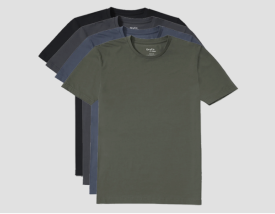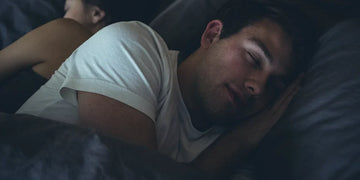Waking up to soaked sheets, damp clothes, and a restless night isn’t just uncomfortable. It’s exhausting. If you’ve ever had to change pajamas in the middle of the night because of sweat, you know how disruptive it can be. These episodes, often called night sweats or nocturnal hyperhidrosis, can happen even in a cool room and leave you feeling drained before the day begins.
While occasional sweating during sleep is normal, night sweats go beyond that. They can soak through bedding and pajamas regardless of temperature. And while they’re frustrating, they’re not something you have to simply live with. Understanding what’s happening inside your body and choosing the right tools to manage it can make a world of difference.
Why Night Sweats Happen?
The medical term for excessive sweating is hyperhidrosis, which describes when your sweat glands go into overdrive, producing more sweat than your body actually needs to stay cool. This can happen during the day or, for some people, at night while sleeping.
It’s more common than most people think. Studies show that roughly 3%–5% of adults experience hyperhidrosis, though the real number is likely higher. Many people never talk about it; they just quietly deal with it.
For some, sweating is localized underarms, hands, feet, or face, known as primary hyperhidrosis. For others, it’s caused by another condition or medication, which doctors call secondary hyperhidrosis. This type often shows up as whole-body sweating, especially during sleep.
Whether it’s hormonal, stress-related, or a side effect of something else, you can still manage the symptoms and reclaim your rest.
Common Triggers Behind Night Sweats
Night sweats can be caused by a mix of physical and emotional factors. Some of the most common include-
Hormonal changes: Fluctuating hormones are a leading cause. Menopause, pregnancy, puberty, or low testosterone can all throw the body’s thermostat out of balance.
Stress and anxiety: When your body thinks it’s under pressure, it activates the fight-or-flight response. Even while you sleep, stress can raise your heart rate and temperature, triggering sweat.
Illness or medication: Certain infections, thyroid issues, or medications like antidepressants or pain relievers can also cause night sweats. If the problem persists, a quick check-in with your doctor can help uncover the reason.
How to Stay Dry: Practical Fixes That Actually Help
The first step is always to understand the cause, but a few small changes can make a big difference right away.
Cool the room: Keep your bedroom temperature between 60–67°F. Use breathable bedding made of cotton, linen, or eucalyptus fiber.
Rethink your evening routine: Avoid spicy food, caffeine, and alcohol before bed. They can all trigger sweating by increasing body temperature.
Stay hydrated: Sip water before and during the night to help your body regulate heat more efficiently.
De-stress before sleep: Light stretching, meditation, or deep breathing can calm the nervous system and reduce sweat-inducing stress.
The Hidden Hero: Sweatproof Undershirts
When you’re dealing with night sweats, your sleepwear can make or break your comfort. That’s where a sweatproof undershirt comes in.
Unlike traditional cotton tees that absorb and hold onto moisture, a hyperhidrosis undershirt uses advanced fabric technology to pull sweat away from your skin. The moisture evaporates instead of pooling, keeping you dry, cool, and comfortable through the night.
It’s like your body’s temperature regulator: breathable, lightweight, and built to work as hard as you do.
Why Sweatproof Undershirts Work

These aren’t your everyday undershirts. They’re engineered for people who sweat more than average or want reliable moisture protection. Here’s how they do it:
● Moisture-wicking layers: Draw sweat away from the skin and release it into the air instead of trapping it.
● Breathable fabric: Materials like MicroModal, bamboo and Polyester spandex help your skin breathe naturally.
● Seamless comfort: A good undershirt fits close to the body without clinging or trapping heat.
● Invisible protection: They’re sleek enough to wear under pajamas or everyday clothing without adding bulk.
Wearing a sweatproof undershirt or hyperhidrosis undershirt at night gives you a dry, distraction-free sleep. You wake up refreshed, not drenched.
Small Changes, Big Relief
Managing night sweats isn’t about one single fix. It’s about layering smart habits with smart clothing.
Start with your sleep environment, stay hydrated, and manage stress. But don’t underestimate how much difference the right base layer can make.
A sweatproof undershirt doesn’t stop your body from sweating. It simply stops the discomfort that comes with it. It keeps moisture under control, your bedding fresh, and your confidence intact.
Frequently Asked Questions
Can a sweatproof undershirt really help with night sweats?
Yes. A sweatproof undershirt is designed with moisture-wicking and absorbent technology that keeps sweat from soaking through to your sheets or pajamas. It helps you stay dry and comfortable even during heavy sweating episodes.
What’s the difference between a regular undershirt and a hyperhidrosis undershirt?
A regular undershirt absorbs sweat but can quickly become damp and clingy. A hyperhidrosis undershirt, on the other hand, channels moisture away from your skin and allows it to evaporate, keeping you dry and cool.
Should I wear a sweatproof undershirt only at night?
Not necessarily. Many people wear them during the day too, especially under work clothes or uniforms. They’re great for anyone who experiences excessive sweating in meetings, commutes, or warm climates.
Are night sweats always a medical issue?
Not always. While they can be linked to conditions like hyperhidrosis or hormonal changes, they’re often triggered by stress, certain foods, or a warm sleep environment. If the problem persists or worsens, it’s best to speak with your healthcare provider.
How do I know if my night sweats are serious?
If your night sweats come with fever, weight loss, or fatigue, it’s worth talking to a healthcare provider. Most cases aren’t serious, but checking early helps rule out underlying issues.
The Bottom Line
Night sweats can interrupt your rest, your mood, and even your confidence. But they don’t have to. Whether they’re caused by hormonal changes, stress, or something medical, comfort is still possible.
Simple changes like cooling your room, staying hydrated, and wearing a sweatproof undershirt can make each night a little calmer and a lot drier. Because the goal isn’t to stop sweating entirely. It’s to stop worrying about it.
Sleep dry, feel confident. Shop Neat’s Sweatproof Undershirts








